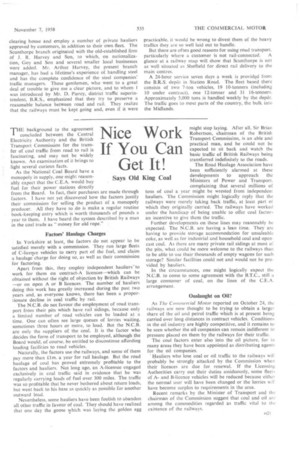Nice Work If You Can Get It!
Page 75

If you've noticed an error in this article please click here to report it so we can fix it.
THE background to the agreement concluded between the Central Electricity Authority and the British Transport Commission for the transfer of coal traffic from road to rail is fascinating, and may not be widely known. An examination of it brings to light several curious facts. Says Old
As the National Coal Board have a monopoly in supply, one might reasonably expect that the C.E.A. would buy fuel for their power stations directly from the Board, In fact, their purchases are made through factors. I have not yet discovered how the factors justify their commission for selling the product of a monopoly producer. All they have to 4::10 is make a regular routine book-keeping entry which is worth thousands of pounds a year to them. I have heard the system described by a man in the coal trade as "money for old rope."
Factors' Haulage Charges
In Yorkshire at least, the factors do not appear to be satisfied merely with a commission. They run large fleets of C-liceve vehicles to carry part of the fuel, and claim a haulage charge for doing so, as well as their commission for factoring.
Apart from this, they employ independent hauliers'to work for them on contract-A licences—which can be obtained without the right of objection by British Railways —or on open A or B licences. The number of hauliers doing this work has greatly increased during the past two years and, as everyone knows, there has been a proportionate decline in coal traffic by rail.
• The N.C.B. do not favour the employment of road transport from their pits which have rail sidings, because only a limited number of road vehicles can be loaded at a time. One can often see large queues of lorries waiting, sometimes three hours or more, to load. But the N.C.B. are only the suppliers of the coal. It is the factor who decides the form of transport to be employed, although the Board would, of course, be entitled to discontinue affording loading facilities to road vehicles.
Naturally, the factors use the railways, and some of them pay more than flm. a year for rail haulage. But the road haulage of coal has proved extremely profitable to the factors and hauliers. Not long ago, an A-licensee engaged exclusively in coal traffic said in evidence that he was regularly carrying loads of fuel over 300 miles. The traffic was so profitable that he never bothered about return loads, but went back to his base as quickly as possible for another outward load.
Nevertheless, some hauliers have been foolish to abandon all other traffic in favour of coal. They should have realized that one day the goose which was laying the golden egg might stop laying. After all, Sir Brian Robertson, chairman of the British Transport Commission, is an able and practical man, and he could not be expected to sit back and watch the basic traffic of British Railways being transferred indefinitely to the roads.
King Coal
The Road Haulage Association have been sufficiently alarmed at these developments to approach the Ministers of Power and Transport. complaining that several millions of tons of coal a year might be wrested from independent hauliers. The Commission might logically reply that the railways were merely taking back traffic, at least part of which they originally carried. The railways have worked under the handicap of being unable to offer coal factor, an incentive to give them the traffic.
Further developments on these lines may reasonably be expected. The N.C.B. are having a lean time. They are having to provide storage accommodation for unsaleable coke, as well as for industrial and household coal and opencast coal. As there are many private rail sidings at most of the pits, what could be more welcome to the railways than to be able to use their thousands of empty wagons for such storage? Similar facilities could not and would not be provided by hauliers.
In the circumstances, one might logically expect the N.C.B. to come to some agreement with the B.T.C., still a large consumer of coal, on the lines of the C.E.A. arrangement.
Onslaught on OH?
As The Commercial Motor reported on October 24, the railways are now thought to be trying to obtain a larger share of the oil and petrol traffic which is at present being carried over long distances in contract vehicles. Condition, in the oil industry are highly competitive, and it remains to be seen whether the oil companies can remain indifferent to pressure placed on them by the railways for their traffic.
The coal factors enter also into the oil picture, for in many areas they have been appointed as distributing agents for the oil companies.
Hauliers who lose coal or oil traffic to the railways will probably be strongly attacked by the Commission when their licences are due for renewal. If the Licensine Authorities carry out their duties assiduously, some fleet, of Aand B-licence vehicles will be reduced because either the normal user will have been changed or the lorries wil! have become surplus to requirements in the area.
Recent remarks by the Minister of Transport and the chairman of the Commission suggest that coal and oil arc among the commodities regarded as traffic vital to the existence of the railways.












































































































































